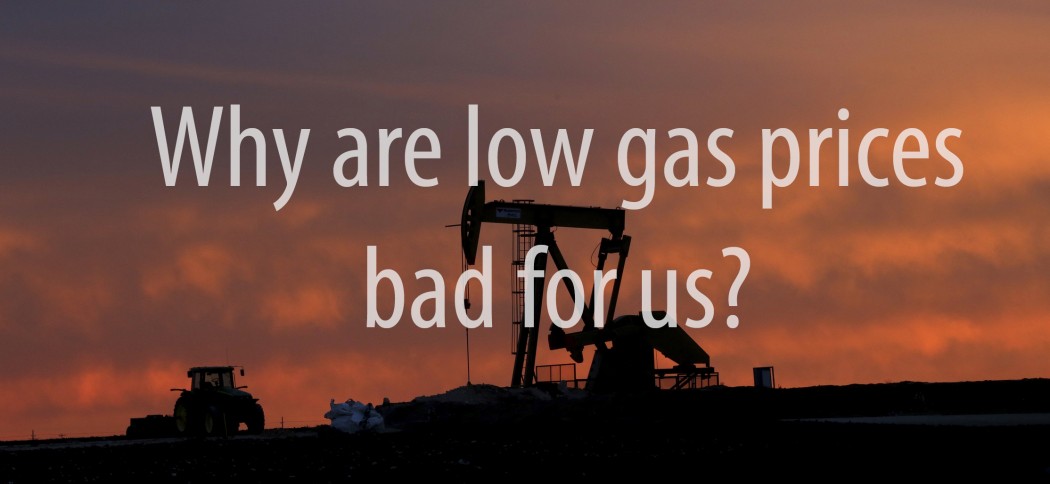We’ve all heard how the stock market is freakin out, how China isn’t growing as fast as it promised and so on, but when people blame petrolium prices we all cock our heads and say, huh?
Don’t low gas and oil prices mean more travel, more business, more everything? Well, not quiet, it seems we’ve found ourselves in an awkward situation, yet again we over hyped a market, bet the farm it would never go bust and are now sitting at the craps table wondering where all our money went. Sound familiar? Remember when everyone said the housing market was the safest bet in town? Well, the oil game is a little like that. If an industry is heavily leveraged, it’s going to go bust, so a better question might be: Why do we keep over inflating our commodities?
From Quartz:
Just a month into the new year, the Dow Jones Industrial Average is down 5.5%. Japan’s Nikkei has dropped 8%, and the Stoxx Europe 600 is 6.4% lower. The blood on the floor even includes fuel-dependent industries that logic suggests should be prospering, such as airlines.
******************
At the beginning of 2014, the world was marveling in surprise as the US returned as a petroleum superpower, a role it had relinquished in the early 1970s. It was pumping so much oil and gas that experts foresaw a new American industrial renaissance, with trillions of dollars in investment and millions of new jobs.
*********************
But it also reflects the tendency of analysts to eagerly embrace a new financial trend first, and only later examine what could happen should it proceed to its natural extremes before suffering the seemingly inevitable hit.
“The misread of the market again illustrates oil’s unfathomability.” Always in such situations, a few traders bet the other way, leading observers to declare them oracles. John Armitage, whose hedge fund made $1.5 billion last year betting on an oil bloodbath, hasn’t yet been crowned a sooth-sayer, though he could be at any time. On the other side, there are traders like Andrew John Hall, a long-time oil prophet who made a big bet starting in 2014 that oil prices were going back up, but they instead plunged; in 2015, he stayed with the bet, and by the end of the year, his hedge fund had reportedly lost more than a quarter of its value.
The analysts defend themselves by noting that they got this and that aspect of oil’s trajectory right, which is fair enough. But it seems all missed the big picture: First, they failed to see that from 2011 to 2014, a surge in shale oil production was going to become a big factor in global supplies; then, they did not anticipate that the same oil would create the mayhem before us now. In fact, in the case of the current turmoil, most forecast the precise opposite—economic nirvana. Interviews with the main institutions that made the bad calls reveal no crisis of confidence, and they are busy putting out analyses of the latest developments.
**************
Consumers have been big winners—gasoline prices have plummeted. That part has happened. But analysts failed to anticipate that the Saudis would refuse to cooperate with the shale gale, as it’s been dubbed, and in fact would declare war on it, even though Riyadh did precisely the same thing in the 1980s. The analysts did not foretell that, if shale oil production rose as they projected, it could drive down prices not only to the $80-a-barrel average that many forecast, but much lower—so low, for so long (see chart below), that companies would put on hold $380 billion (and counting) in oil and natural gas field investment, and fire 250,000 industry workers around the world last year (including around 90,000 in the US).
***************
Nor did they foresee that many of the companies themselves would be at risk of bankruptcy (42 already filed as of last year). Of 155 US oil and gas companies studied by Standard & Poor’s, one third are rated B- or less, meaning they are a high risk of default. These companies’ debt is selling at just 56 cents on the dollar, below even the level during the financial crash. As a measure of this vulnerability, the 60 leading US independent oil and gas companies have accumulated $200 billion in debt.
In the bigger picture, none took account of the emerging markets’ addiction to investment from OPEC, whose billions of dollars today are either being withdrawn or simply no longer sent. This, along with an evaporation of recycled petrodollars from Europe, is consigning those emerging nations to recession, as reported first by Izabella Kaminska and her Financial Times colleagues.
“Unfortunately, we are all slaves to history,” said Robin Mann, an energy analyst with Deloitte. “We kind of fall back to what historically has happened.”
*************************
Keep reading for a great history lesson on how oil has dominated the world stage






